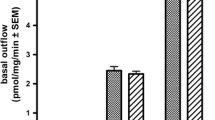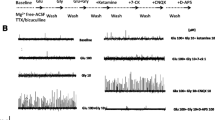Summary.
This study investigated the effects of bilobalide, a constituent of Ginkgo biloba, on potassium and veratridine-induced release of glutamate and aspartate from mouse cortical slices. We also studied its effects on spontaneous and N-methyl-D-aspartate (NMDA)-induced depolarizations elicited in magnesium-free artificial cerebrospinal fluid (aCSF) as well as its effect on NO-711 (a γ-aminobutyric acid (GABA) uptake inhibitor)-induced depolarizations. Bilobalide, 100 μM significantly reduced both glutamate and aspartate release elicited by potassium or veratridine. Bilobalide (5–100 μM) also significantly reduced the frequency of NO-711 induced depolarizations, however, it had no effect on spontaneous or on NMDA-induced depolarizations at 5–200 μM. These results suggest that the neuroactive properties of bilobalide may be mediated by a reduction in excitatory amino acid neurotransmitter release.
Similar content being viewed by others
Author information
Authors and Affiliations
Additional information
Received June 25, 2001 Accepted October 4, 2001
Rights and permissions
About this article
Cite this article
Jones, F., Chatterjee, S. & Davies, J. Effects of bilobalide on amino acid release and electrophysiology of cortical slices. Amino Acids 22, 369–379 (2002). https://doi.org/10.1007/s007260200021
Issue Date:
DOI: https://doi.org/10.1007/s007260200021




